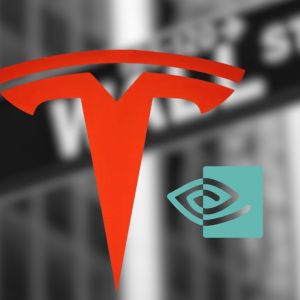Tesla is Wall Street’s latest obsession, and it’s not hard to see why. The stock’s been on a tear, climbing 40% since the U.S. presidential election. At $476.73, Tesla’s market cap now sits at a jaw-dropping $1.53 trillion. Compare that to Nvidia—last year’s golden child of growth stocks—sitting at $129.92 with a market cap of $318 billion. Analysts aren’t missing a beat. Tesla and Nvidia are two sides of the same coin: both are fueled by a tech future that seems unstoppable. Tesla has cars and autonomous tech; Nvidia has chips and AI infrastructure. One builds the machine, the other runs the software. Yet while Nvidia’s growth is starting to cool, Tesla’s numbers keep pulling investors in. Tesla’s 52-week range speaks volumes: it’s climbed from $138.80 all the way to $483.99 this year. Nvidia has moved between $47.32 and $152.89, a solid performance but far from Tesla’s high-octane climb. Why Wall Street’s watching Tesla like it watched Nvidia Cathie Wood, CEO of Ark Invest, says she sees Tesla hitting $2,600 by 2029, driven by what she calls “unmatched growth” in profits and revenues. If Wood’s predictions play out, Tesla could hit an enterprise value of $8.2 trillion in just five years. That makes Nvidia’s peak look tame by comparison. Investors are biting. The excitement is Tesla’s move toward AI-powered autonomous driving. It’s no secret Tesla isn’t just an electric car company anymore. Self-driving software and its robotaxi ambitions have Wall Street betting on a future Tesla that doesn’t just sell cars—it sells rides, powered by AI. Tesla’s strategy echoes Nvidia’s dominance during the AI boom. Nvidia’s chips became essential to generative AI development, fueling companies like OpenAI and driving profits to record highs. Tesla’s AI, on the other hand, lives on the roads. If it perfects autonomous driving, its software will become as essential as Nvidia’s chips. But there’s a catch. Tesla trades at a staggering price-to-earnings (P/E) ratio of 162. Nvidia’s ratio? A much more palatable 51.14. That makes Tesla a high-risk, high-reward bet. Goldman Sachs recently pointed this out, cautioning that Tesla’s valuation may be running ahead of its earnings. Nvidia’s growth is slowing, Tesla’s just getting started Nvidia is still the face of AI infrastructure, but the cracks are showing. After growing revenue by over 200% in recent quarters, analysts now expect Nvidia’s growth to slow to around 70%. Still impressive, but a clear sign that the AI boom is leveling out. Nvidia’s reliance on a handful of mega clients—like cloud giants and AI startups—has some investors worried. Tesla, meanwhile, is all momentum. The market sees a company that’s just scratching the surface of its AI potential. Self-driving cars are Tesla’s big bet. The trading data backs this up. Tesla has been gaining traction as one of Wall Street’s most traded stocks. Nvidia still holds the crown, with 197 million shares traded on December 17 compared to Tesla’s 108 million. Investors go all in on US stocks The bullish sentiment on Tesla is part of a broader trend. Bank of America’s Global Fund Manager Survey shows investors are dumping cash and going all in on equities. Cash allocations hit their lowest point since 2001, falling from 4.3% to 3.9%. That’s a sign investors are chasing gains and aren’t interested in sitting on the sidelines. Michael Hartnett, a strategist at Bank of America, called the mood “super-bullish.” Tesla’s surge, fueled by its AI story, is a perfect fit for this environment. Wall Street sees a growth machine, and it’s hungry for more. Interest rate cuts are adding fuel to the fire. Traders expect the Federal Reserve to start cutting rates, making stocks even more attractive. The S&P 500 is on track to close 2024 up more than 26%, far beyond anyone’s expectations. Analysts now predict another 10% climb next year, with growth stocks like Tesla leading the way. Nvidia played that role in 2023. Now Tesla’s taking the baton. Land a High-Paying Web3 Job in 90 Days: The Ultimate Roadmap










